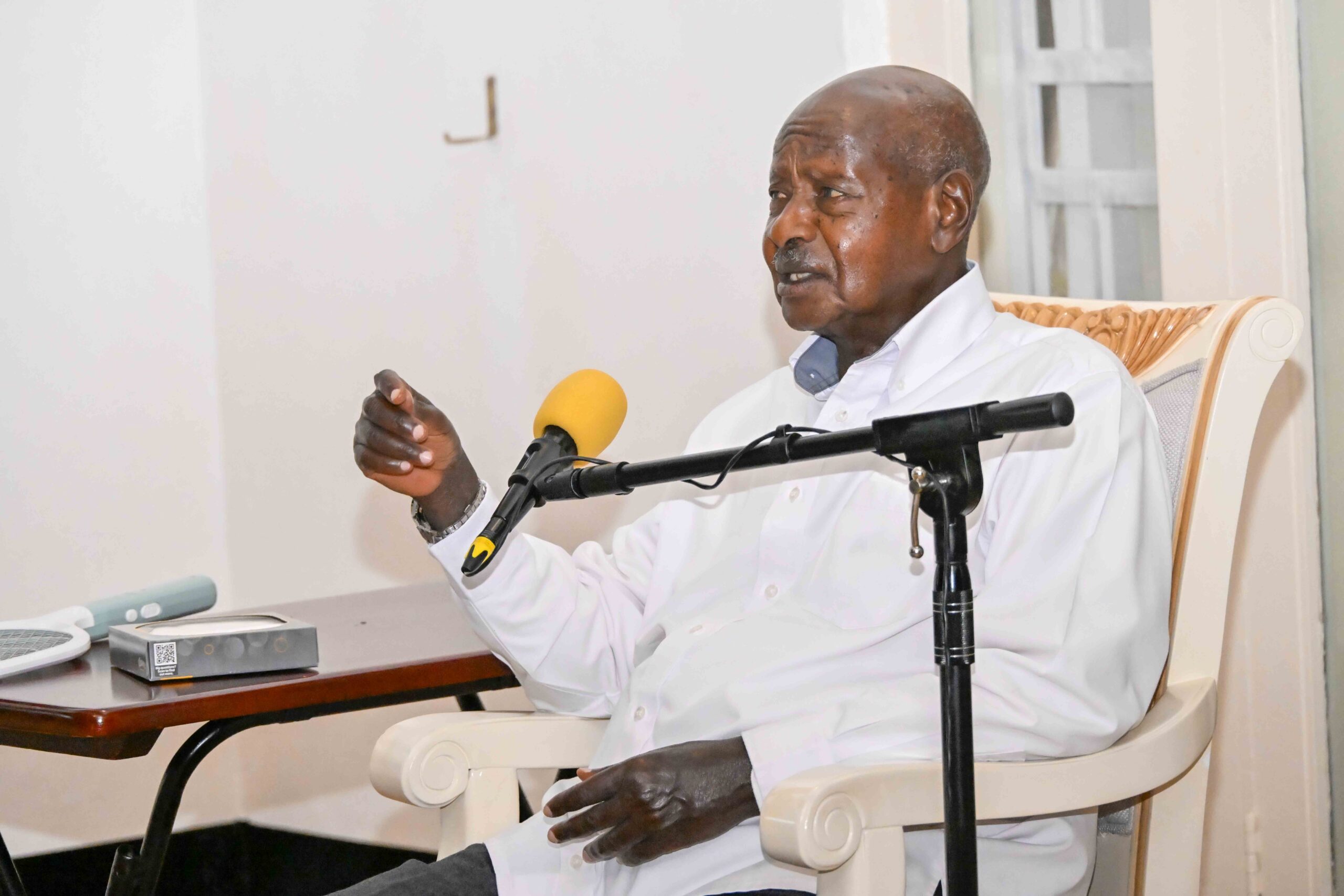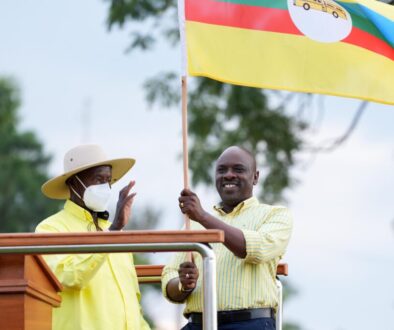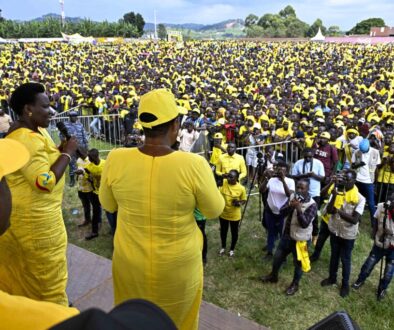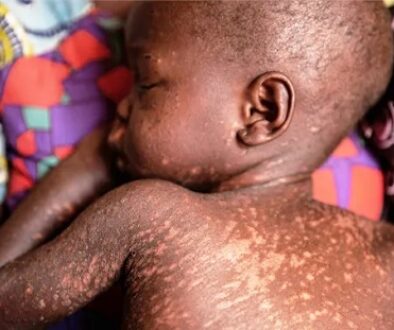Focus on real change, not excitement says Museveni

By Stephen Wandera Ouma
MBALE – President Yoweri Kaguta Museveni has held an engagement with groups of the National Resistance Movement (NRM) youth mobilizers urging them to ground their political work by understanding people’s daily struggles, especially poverty.
The youth mobilizers were led by Ms. Hellen Seku, Commissioner of the National Secretariat for Patriotism Corps (NSPC) at State Lodge – Mbale Monday 10th 2025.
The groups present included the Buganda Youth Caucus, the National Youth Council (Executive), Buganda Ku Museveni, the National Secretariat for Patriotism Corps, the Yellow Power Movement and district-level NRM mobilizers.
In a candid interaction, the President told the mobilizers that true political mobilization goes beyond excitement and singing. He said it requires first understanding whether communities are in good or difficult situations and then guiding them on how to solve their problems.
“When you talk of mobilization, you must ask, how are these people? Are they in a good situation or a bad situation, especially poverty? The real mobilization is to get people out of poverty. The real mobilization is to know people’s problems and show them how to get out of poverty,” President Museveni said.
He added that while crowds may turn up for rallies out of excitement, lasting support comes from communities recognizing that their leaders have real solutions.
“People should understand their problems and how to solve them instead of just moving around singing. They may support you for networking, but the impact is small. People trusted us because they thought we had ideas and answers to their problems,” he said.
The President noted that the growing crowds at current NRM rallies reflect two things; basing on the peace ushered in after years of conflict, especially in previously war-affected areas, and the fact that the Parish Development Model has begun reaching households directly.
“In the past, programs passed through intermediaries and our own people ended up being involved in their own things. That is how I stopped Operation Wealth Creation,” he said.
Drawing parallels to the Luweero Triangle’s support during the liberation struggle, President Museveni reminded the youth that people rallied behind him and his colleagues at that time because they analyzed their problems well and offered practical answers.
He emphasized that effective mobilization does not require large budgets.
“This mobilization does not need a lot of money. The only money you may need is your own transport for fuel, not refund,” he said.
He encouraged the mobilizers to reflect on how the NRM built trust before forming government.
“I am glad you came. You are young people. When we started, we were like you. We showed the people the way forward. We refused gender divisions and religious divisions. We taught them how to get out of poverty, and to be well behaved. Let your light shine before men.”
President Museveni again highlighted the Four Acre Model, first introduced in the 1996 manifesto, as the foundation for sustainable household wealth.
He explained that one acre should be planted with coffee, one with fruit trees like citrus or mangoes, one dedicated to pasture for livestock, and one for food crops.
He later broadened his discussion into a deeper analysis of Uganda’s socio-economic transformation, noting that mobilizers must understand the three parts of society, the people, their economic wellbeing, and their politics.
He gave an example of the traditional Banyankole communities who lived as nomads and worked only for the stomach despite owning cows.
The President explained: “We studied the world. In America, Australia and New Zealand, they also had cows, but the cows were valuable in terms of money. Our idea was: why can’t our people be like the ranchers in America?”
The President added that a proper diagnosis revealed four major obstacles keeping cattle corridor communities out of the money economy, lack of water due to absence of natural springs, bush burning during the dry season, tick-borne diseases, and the cultural habit of keeping cattle for prestige rather than commerce.
“We had to sit down and read their minds, to find out what was stopping them from joining the money economy,” he said.
“For water, we said: you must trap water from the roof. For bush burning, we told them to stop burning grass in the dry season. For ticks, they kept running away instead of treating diseases, yet we had Mbarara Stock Farm.”
He said proper mobilization must always begin with such deep diagnosis of community challenges.
Mr. Henry Luzinda, a mobilizer from Wakiso District, thanked the President for empowering young people through programs like the Parish Development Model and the proposed Graduate Fund.
“Youth livelihoods are changing Your Excellency, thank you for the 30% of PDM funds that you are giving to the youth, thank you so much for the graduate fund. We commit to take this message village to village so that the youth who graduate after two years and haven’t found a job can benefit from this fund which is your initiative,” he said.
Ms. Sawuya Nambatta, Chairperson of Buganda Ku Museveni, said PDM has already transformed lives in many communities, and mobilizers are spreading that success story across villages.
Another mobilizer, Mr. Pauson Twinamatsiko, also expressed gratitude to the President for supporting youth-led initiatives.
Meanwhile, he President, who concluded his campaign tour of Bugisu with a grand rally for Mbale City and District on Monday, said the NRM’s legacy in the region is visible through the roads, electricity, schools, and agricultural programmes that have improved livelihoods and enabled economic growth.
He noted that the foundation of these developments is the peace and stability established by the NRM government, which rejected divisive politics and built strong national institutions rooted in patriotism and professionalism.
“The NRM brought peace to Uganda because of the way we look at things,” President Museveni said. “We don’t believe in sectarianism—religion, tribe, or gender. Because of that, we have been able to build a strong party and create stability in our politics.”
President Museveni said the government has invested heavily in road infrastructure to connect Bugisu’s productive areas to markets and services.
Among the key projects completed or under way are the Mbale–Soroti, Mbale–Budaka, and Mbale–Bubulo–Bugobero roads. Construction has started on the Mbale–Magale–Namisindwa road, while the Mbale–Nkonkonjeru and Butaleja roads are in the pipeline.
“The improved road network has boosted trade between Mbale, Tororo, Budaka and neighbouring districts,” he said. “It has made it easier for our farmers to take coffee, bananas and other produce to markets.”
Rehabilitation of the Tororo–Mbale–Gulu–Pakwach railway line is also under way to cut transport costs and boost trade.
Electricity and telecommunication coverage have expanded significantly across Mbale and the surrounding districts. Rural electrification projects have reached most trading centres, supporting small-scale industries and services that are spurring local economic activity.
Access to safe water has improved greatly in Mbale District, with 484 of its 613 villages — about 79 percent — now served by clean water sources. The government plans to extend coverage to the remaining 21 percent. Piped water systems have also been installed in Mbale City, Nakaloke, Nambale, and Nabumali.
President Museveni also highlighted investments in water for production and irrigation to promote commercial farming.
“We are investing in irrigation because we must stop depending only on rain-fed agriculture,” he said. “Using the mountains and valleys properly will increase productivity and prevent disasters like mudslides.”
Projects such as the Namatala and Nakusi Solar-Powered Irrigation Schemes and the Wabukhasa Valley Tank already serve thousands of farmers.
The expansion of education facilities has been one of the most visible achievements of the NRM in Bugisu. Mbale alone now has 21 government secondary schools, up from just a handful before 1986. Primary school enrolment has also increased under Universal Primary Education.
The President said the government is prioritizing skills development to empower the youth. A regional skilling hub is being established in Mbale to train young people in carpentry, metalwork, tailoring, and mechanics.
“In these skilling hubs, I train young people for just six months and they become useful to society,” he said.
“They produce goods we used to import from Italy and China.”
President Museveni reminded residents that while the government provides infrastructure, the responsibility for creating household wealth lies with individual families.
“Development is ours, but wealth is yours,” he said. “We have built the infrastructure, but each family must now use it to create wealth.”
Programmes such as the Parish Development Model (PDM) and Emyooga are helping households join the money economy through commercial farming and small businesses. Each parish will receive an additional Shs15 million to strengthen local enterprises, while special funds are being created for religious institutions, unemployed graduates, and ghetto youth. The Mbale Industrial Park is also expanding, creating new jobs in manufacturing and services.
The President cautioned that all these achievements depend on maintaining peace and security.
“Nobody can disturb our peace. Anybody who tries will be dealt with,” he warned. “We must protect the gains we have made and move into the future with confidence.”
He urged the people of Bugisu to reject sectarian politics and remain united behind the Movement’s development agenda, saying discipline, hard work, and unity are key to sustained transformation.
Leaders Commend NRM
The NRM Vice Chairperson for Eastern Region, Calvin Echodu, thanked the President for his long-standing commitment to Bugisu’s development and cautioned residents against divisive politics.
Mbale District NRM Chairperson, Moses Wambogo, praised the government’s investment in roads, power, and water, saying the initiatives have opened up new opportunities for farmers and traders.


